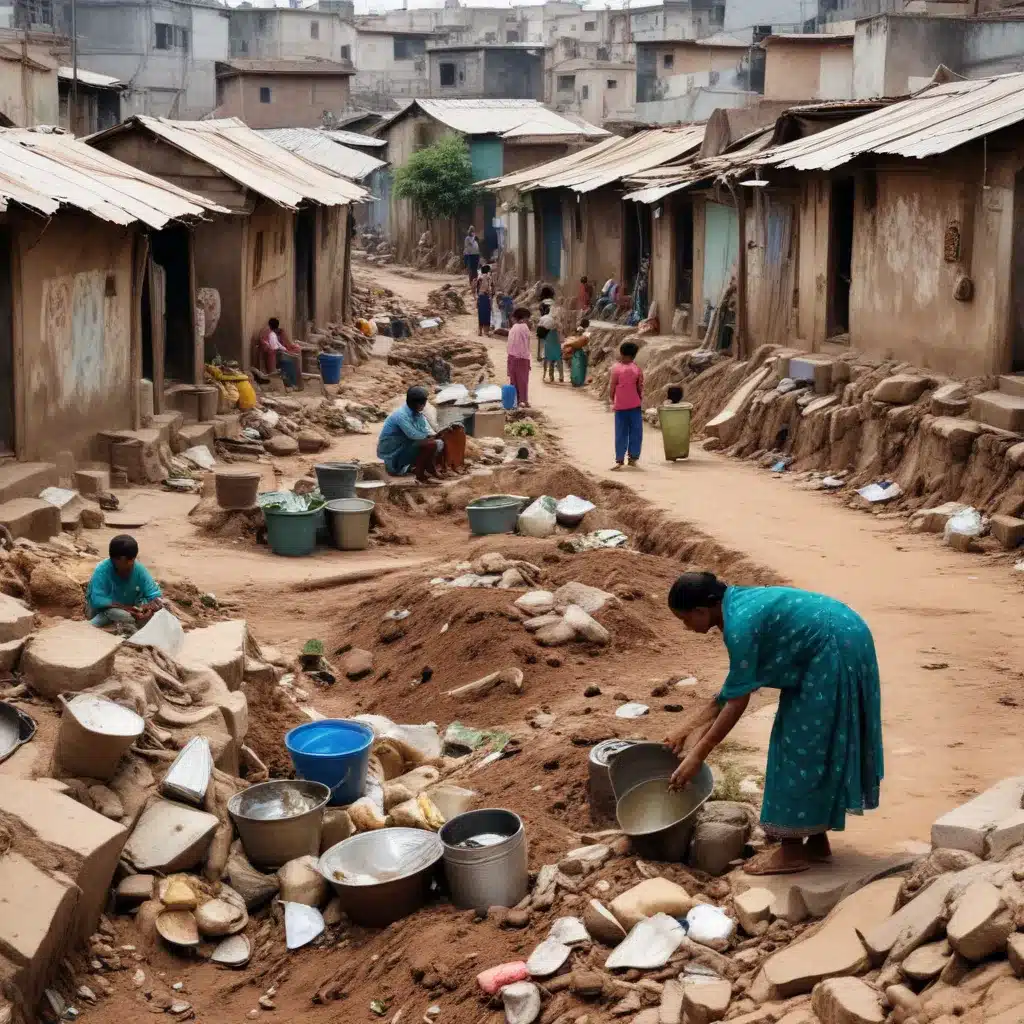
Empowering Residents to Drive Change
Solid waste management is a persistent challenge in the slums of Hyderabad, India, where residents face a myriad of health and environmental risks due to improper waste disposal. However, a community-driven approach is emerging as a promising solution, empowering local stakeholders to monitor and improve waste management in their neighborhoods.
By leveraging the power of community-based monitoring, residents in Hyderabad’s slums are taking ownership of solid waste issues and driving sustainable change. This innovative model taps into the firsthand knowledge and commitment of those most affected, enabling them to identify problems, propose solutions, and hold service providers accountable.
“When the community is engaged and invested, the results are transformative. We’ve seen how citizen-led monitoring can dramatically improve solid waste management, leading to cleaner, healthier environments.”
– Neha Gupta, Urban Development Specialist
Overcoming Systemic Challenges
Hyderabad’s slum communities face a range of deeply-rooted challenges when it comes to solid waste management. Inadequate collection services, limited infrastructure, and a lack of public awareness contribute to widespread illegal dumping and burning of waste. These issues stem from systemic factors, including:
-
Insufficient Public Investment: Cash-strapped municipal authorities often lack the resources to provide reliable waste collection, treatment, and disposal services in low-income neighborhoods.
-
Weak Accountability Mechanisms: Residents have limited avenues to provide feedback or hold service providers accountable for service gaps or poor performance.
-
Entrenched Behaviors: Decades of reliance on informal waste disposal methods have normalized harmful practices, making behavioral change a persistent challenge.
-
Marginalization of Slum Dwellers: Slum communities often face discrimination and neglect from local governments, hindering their ability to advocate for improved services.
Addressing these deeply-rooted issues requires a collaborative, community-driven approach that empowers residents as active partners in the solution.
Catalyzing Community-Driven Change
The Joint Action for Water (JAW) initiative has pioneered an innovative model of community-based monitoring to tackle solid waste challenges in Hyderabad’s slums. By training and supporting local resident groups, the program is enabling slum dwellers to take the lead in identifying problems, proposing solutions, and collaborating with service providers.
At the heart of this approach are Community Monitoring Groups (CMGs) – teams of engaged residents who conduct regular assessments of waste management services in their neighborhoods. Armed with user-friendly tools and techniques, the CMGs systematically gather data on collection coverage, disposal practices, and community satisfaction.
“The CMGs have given us a voice. We can now track waste collection, report issues, and work with the municipality to improve services. It’s empowering to be part of the solution.”
– Fatima, Community Monitoring Group member
Using this evidence, the CMGs then engage with local authorities, service providers, and other stakeholders to advocate for service improvements and ensure accountability. Through a combination of constructive dialogue, public campaigns, and collaborative problem-solving, the groups have catalyzed tangible changes in their communities.
Driving Service Improvements
The impact of community-based monitoring is already evident in several Hyderabad slums. By elevating resident concerns and collaborating with service providers, the CMGs have achieved remarkable progress:
-
Expanded Waste Collection Coverage: CMGs have worked with municipal sanitation workers to expand the reach of door-to-door collection services, ensuring that more households have access to reliable waste pickup.
-
Improved Disposal Practices: Leveraging data from community assessments, CMGs have advocated for the installation of transfer stations and bulk waste bins, reducing illegal dumping and open burning.
-
Enhanced Community Engagement: CMGs have spearheaded public awareness campaigns on proper waste segregation and disposal, fostering behavior change and a greater sense of civic responsibility.
-
Strengthened Accountability: Regular monitoring and constructive dialogue have improved responsiveness from service providers, who now promptly address service gaps and resident complaints.
“The CMGs have been a game-changer. By working hand-in-hand with the community, we’ve been able to significantly improve waste collection and disposal in these slums. It’s a powerful model that we’re looking to scale up.”
– Ravi Sharma, Municipal Sanitation Department
Scaling Up for Greater Impact
Building on these early successes, the JAW initiative is now working to scale up the community-based monitoring approach across Hyderabad’s slum settlements. By training and supporting new CMGs, the program aims to empower more residents as active partners in solid waste management.
Crucially, the initiative is also strengthening linkages between CMGs and local authorities, facilitating ongoing collaboration and joint problem-solving. This mutually-beneficial relationship not only drives service improvements but also enhances the capacity and responsiveness of municipal sanitation departments.
“Community-based monitoring is a game-changer for solid waste management. By tapping into the knowledge and commitment of local residents, we can develop tailored solutions that truly meet the needs of slum communities.”
– Anita Desai, Director, Joint Action for Water
As the Hyderabad experience demonstrates, empowering residents as active agents of change is key to overcoming the complex, multifaceted challenges of urban solid waste management. By scaling up this innovative model, the JAW initiative aims to catalyze sustainable, community-driven improvements in slums across the city – and inspire similar approaches in other Indian cities grappling with this pressing issue.
Conclusion
Solid waste management in Hyderabad’s slums is a persistent challenge, but a community-driven approach is emerging as a promising solution. By leveraging the power of community-based monitoring, local residents are taking ownership of waste issues and driving sustainable change in their neighborhoods.
Through the Joint Action for Water initiative, slum dwellers are forming Community Monitoring Groups to systematically assess waste management services, engage with service providers, and advocate for improvements. This innovative model has already achieved tangible results, expanding collection coverage, enhancing disposal practices, and strengthening accountability.
As the JAW initiative scales up this approach, it aims to empower more residents as active partners in solid waste management – catalyzing sustainable, community-driven change that can serve as a model for other Indian cities facing similar challenges. By tapping into the knowledge and commitment of local stakeholders, this pioneering initiative is proving the transformative potential of community-based monitoring in urban sanitation.

